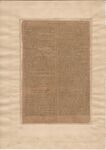< Can the Use of Anesthetics Demonstrate the Existence of the Soul? (continued from page 10-151) >
been in Paradise, and beheld things impossible to utter. Although St. Paul says that when caught up into Paradise he beheld things not lawful to utter, he knew not whether he was in or out of the body.
The sceptic will say all this proves nothing but hallucination and dreams.
In reply to this objection, I would say that trance is a condition entirely beyond mere sleep, and that visions of the. spirit are entirely distinct from the dreams of imperfect sleep.
No one in mere sleep can submit to painful operations, not only without flinching, but with the smile of joy on his face; and no one dreams that he is outside his body; he dreams that he is with his body; and sceptics who merely suggest explanations cannot have the weight of those who assert their beliefs from experience.
I therefore submit that sceptics have, with the use of anæsthetics, a physical and scientific means of testing the beliefs and assertions of pneumologists as to the existence outside the body of the soul or ego as a scientific fact.
The sceptic will deny that the all but universal belief of human beings in the existence of the soul has any scientific weight. He will further deny the authority of spiritual revelations. He will discredit the experiments of mesmerists, and deny the assertions of Hindu or Christian ecstatics; but if he experiment with medicinal anæsthetics on his own person, and find out, as I and others have done, that the soul may be projected outside the body, and externally exist as the true ego, he may then be induced to believe in the existence of the human soul.
If thus the soul can be demonstrated as a fret, the next step is to postulate that the ego, or soul, or mind is a unity.
All visible substances arc compounds, and as compounds are liable to disintegration, decay, and death. Even the royal gold can thus be, from its liability to slow decay, shown to be not an elementary but a compound substance. But the soul as a unity is incapable of division, therefore incapable of decay, and is therefore immortal.
12, Great Cumberland-place, Hyde Park, London, December 16th, 1879.
Personal Observations
...
Editor's notes
- ↑ Personal Observations by Fechner, Gustave Thoedore, Spiritualist, The, Dec. 26, 1879

